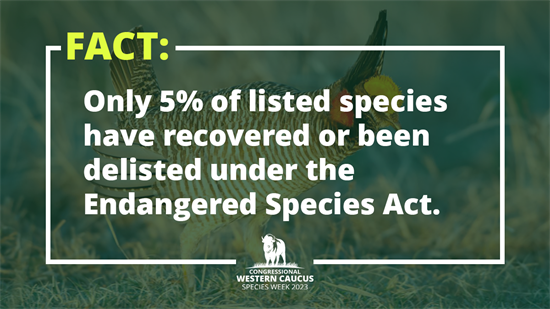Chairman Newhouse Slams Proposed Endangered Species Act Rules
Washington,
June 22, 2023
|
Amanda Bihl
(202-317-0098)
WASHINGTON, D.C. – Yesterday, the U.S. Fish and Wildlife Service proposed several burdensome rules related to the Endangered Species Act (ESA). Congressional Western Caucus Chairman Dan Newhouse (WA-04) released the following statement in response: “The Endangered Species Act has long been weaponized by special interest groups to halt projects and economic development in rural communities, even as it fails to achieve the very goal it was put in place to achieve: recovering species,” said Chairman Newhouse. “Yesterday’s move by the Biden Administration erases any progress we’ve been able to achieve in modernizing this statute and rolls it back to a former, more archaic version. While I am deeply disappointed in what was clearly a politically-motivated decision, it will not detract me from working with my colleagues here in Congress and the Western Caucus to pursue collaborative conservation efforts that empower private landowners and industry partners to achieve the goal of removing species from the Endangered Species Act’s threatened or endangered species lists.” Background: The Endangered Species Act (P.L. 93-205 or Act) was enacted in 1973 and last amended by Congress in 1988. In 2019, the previous administration finalized several rules that address how the U.S. Fish and Wildlife Service (FWS) and the National Marine Fisheries Service (NMFS) implements the ESA. The three rules at issue today address the implementation of sections 4 and 7 of the ESA. Section 4, among other things, deals with adding species to or removing species from the ESA’s protections and designating critical habitat. In particular, one of the proposed rules would reinstate the so called “blanket 4(d) rule”. A "blanket 4(d) rule" under the ESA allows the FWS to extend most of the prohibitions for endangered species to threatened species. This was clearly not the intent of the ESA, or else Congress would not have created the two listing categories. A 2019 rule finalized under the Trump administration requires FWS to create species specific 4(d) rules to bolster protections. The FWS had admitted in the past that when they develop species-specific 4(d) rules, they have seen more benefits, including removing redundant permitting requirements and facilitating implementation of beneficial conservation actions. Section 7 covers consultations with other federal agencies. The 2019 rule clarifies the interagency consultation process and makes it more efficient and consistent by codifying alternative consultation mechanisms that may provide greater efficiency for how ESA consultations are conducted. The 2019 rule also establishes a deadline for informal consultations to provide greater certainty for federal agencies and applicants of timely decisions, without compromising conservation of ESA-listed species. Today, the Biden administration proposed rolling back crucial reforms implemented in the 2019 rulemaking and returning the ESA to its overly burdensome and archaic form. |
Stay Connected
Use the following link to sign up for our newsletter and get the latest news and updates directly to your inbox.


